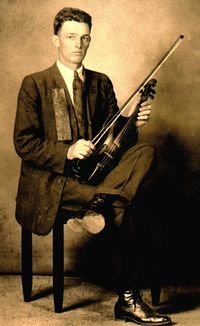Annotation:Boys My Money's All Gone (1): Difference between revisions
(Created page with "=='''Back to [[{{BASEPAGENAME}}]]'''== ---- <p><font face="garamond, serif" size="4"> '''BOYS, MY MONEY'S ALL GONE [1]'''. Old-Time, Breakdown. A Dorian or Mixolydian/Dorian. ...") |
No edit summary |
||
| Line 17: | Line 17: | ||
</font></p> | </font></p> | ||
<p><font face="garamond, serif" size="4"> | <p><font face="garamond, serif" size="4"> | ||
''Recorded sources'': <font color=teal>County Records 507, Charlie Bowman - "Old Time Fiddle Classics." </font> | ''Recorded sources'': <font color=teal> Columbia 15387-D (78 RPM), Charlie Bowman and His Brothers (1929). County Records 507, Charlie Bowman - "Old Time Fiddle Classics." </font> | ||
</font></p> | </font></p> | ||
<br> | <br> | ||
Revision as of 04:21, 6 January 2014
Back to Boys My Money's All Gone (1)
BOYS, MY MONEY'S ALL GONE [1]. Old-Time, Breakdown. A Dorian or Mixolydian/Dorian. Standard tuning (fiddle). AABB.

Old-Time versions of "Money in Both Pockets" are sourced to a February, 1929, recording by East Tennessee fiddler Charlie Bowman [1] (1889-1962) and His Brothers, called "Moonshiner and His Money", which was Columbia Records first entree into recording early country music. "Moonshiner and His Money" was a skit with music, along the lines of the Skillet Licker's successful similar recordings. There were two tunes played in between banter, "Money in Both Pockets (3)" and "Boys My Money's All Gone (1)."
Source for notated version: East Tennessee fiddler Charlie Bowman [Phillips].
Printed sources: Kaufman (Beginning Old Time Fiddle), 1977; p. 97. Phillips (Traditional American Fiddle Tunes), vol. 1, 1994; p. 35. Reiner (Anthology of Fiddle Styles), 1979; p. 97.
Recorded sources: Columbia 15387-D (78 RPM), Charlie Bowman and His Brothers (1929). County Records 507, Charlie Bowman - "Old Time Fiddle Classics."
